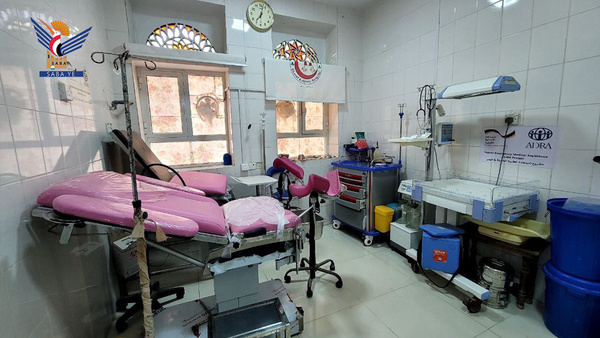Hajjah – SABA:
Throughout 2024, Martyr Sharaf Al-Kohlani Rural Hospital in Mabyan District, Hajjah Governorate, recorded significant achievements and strides in improving the quality of medical services offered to citizens.
The hospital’s growth and the qualitative leap in healthcare services provided to residents of the district and surrounding areas reflect effective implementation of planned strategies aimed at alleviating the suffering of the population.
The increased turnout and diversification of medical services over the past year underscore the commitment of the Governorate’s Health and Environment Office, relevant authorities, and humanitarian partners supporting the hospital.
In 2024, the hospital was supplied with numerous medical devices and equipment across various departments to raise the standard of care—despite the ongoing blockade and aggression.
General medical departments previously lacking at the facility—such as neonatal care, surgery, and X-ray—were inaugurated after full rehabilitation. Several other units were upgraded with the latest therapeutic and diagnostic equipment to enhance the quality, safety, and effectiveness of patient care.
Hospital management prioritized capacity-building for its medical, technical, and administrative staff by conducting a series of training courses and development programs aimed at service improvement.
Backed by the Health and Environment Office and humanitarian partners, the hospital implemented various projects to overcome the difficulties imposed by the current situation. On average, 280 patients received medical services per day.
In coordination with the Health Office and relevant bodies, hospital leadership worked to expand and enhance services in line with infection control policies and increased inpatient capacity—raising the hospital’s bed count to 37 beds in the first phase.
According to a report received by the Yemeni News Agency (SABA), the hospital provided 306,356 medical services in 2024 to 119,631 patients across all departments.
The report detailed that 54,383 patients benefited from outpatient clinics, including:
- 9,836 in internal medicine
- 4,018 in general surgery
- 11,174 in obstetrics and gynecology
- 10,284 in pediatrics
- 3,526 in nutrition
- 15,572 in general medicine
Emergency departments received 19,886 cases, with 488 inpatient admissions, 474 natural births, and 483 surgical operations, including 46 major surgeries.
The pharmacy dispensed medications to 121,100 patients, while the radiology department served 6,827 patients, including:
- 4,638 ultrasound scans
- 812 ECGs
The laboratory served 16,968 patients.
Additionally, the report noted:
- 8,532 patients treated for waterborne illnesses
- 2,603 severe cases
- 3,021 moderate cases
- 5,034 children benefited from the immunization department
- 5,363 patients received maternal and counseling services
- 683 patients received mental health support
- 214 malnourished patients treated in the nutrition department
- 19 premature infants received care in the neonatal unit
During a free medical camp organized in cooperation with the Health Office, the hospital provided free medical services to 415 inmates at the provincial rehabilitation facility.
The report highlighted various training sessions for hospital staff on:
- Medical waste segregation
- Blood transfusion policy
- Antibiotic administration policy
- Medical ethics and conduct
- Patient file documentation
- Infection control
- Quality assurance systems
Other workshops included:
- Sterilization procedures
- Equipment handling during shift transitions
- Disaster and mass-casualty management
- Training on medical, financial, and supply systems during service delivery
Hospital Director Dr. Mohammed Al-Faqih praised the efforts of the Health Office and humanitarian partners for supplying key equipment and supporting the operational leap following the opening of surgical and neonatal departments.
He stated that the hospital aims to:
- Construct an independent emergency department
- Build half of the second floor
- Complete the blood bank and obstetrics surgery room
- Equip a dental clinic
- Provide an echocardiography machine
- Supply batteries for the solar power system
- Expand the women’s inpatient ward
- Build a pediatric inpatient ward for children with acute malnutrition (TFC)
- Complete surveillance systems and establish general storage facilities
Dr. Al-Faqih also emphasized the hospital’s efforts to recruit specialists in fields such as ENT and infection control to reduce the need for patients to travel to other districts, in line with the Health Office’s plans to improve local service delivery.

| more of (Reports) |




